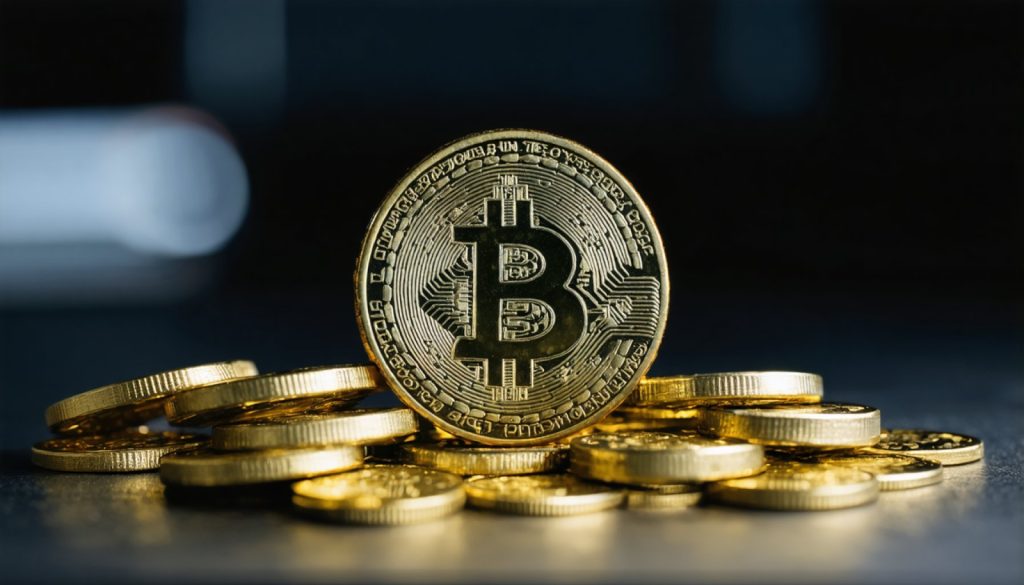
- Global financial markets are facing uncertainty due to new U.S. trade tariffs, but Bitcoin is showing resilience and potential as a new ‘store of value.’
- U.S. stock markets have declined by around 10% under the pressure of trade tensions, while Bitcoin’s performance remains strong, decoupling from traditional markets.
- Notable figures, including BlackRock’s CEO Larry Fink and U.S. Treasury Secretary Scott Bessent, suggest Bitcoin may serve as an alternative to gold as a hedge against economic volatility.
- Bitcoin continues to attract interest with its uncorrelated returns despite inherent risks, signaling a possible evolution in its role as a financial asset.
- The narrative surrounding Bitcoin highlights its potential to redefine value in the evolving global financial climate.
A charged tide of uncertainty grips global financial markets as fresh U.S. trade tariffs ripple through the economy, instigated by President Donald Trump’s bold economic gambits. Amidst this turmoil, a radiant beacon of digital hope flickers: Bitcoin. Once known simply as a speculative play, Bitcoin has recently demonstrated remarkable resilience, breaking free from its tether to traditional markets and raising an intriguing question—could Bitcoin emerge as the new gold?
In recent weeks, stock markets worldwide have faltered under the weight of trade tensions. Trump’s aggressive “Liberation Day” tariffs, which implemented sweeping import taxes, have unnerved investors, with the U.S. stock market dipping around 10%. Yet, while traditional equity suffers, Bitcoin has rebelled against this trend. The digital currency’s buoyant defiance amid widespread volatility suggests it may be forging a new identity as a ‘store of value.’
Prominent finance figures are taking note. Larry Fink, BlackRock’s CEO, recently hinted at Bitcoin’s growing allure as a safer bet compared to the volatile ebbs and flows of the U.S. dollar. Echoing this sentiment, Treasury Secretary Scott Bessent likened Bitcoin’s role in the contemporary market landscape to that of gold—a classic hedge against financial uncertainty. Gold, after all, has seen a 15% surge this year, attracting wary investors seeking refuge from turbulence.
This newfound regard for Bitcoin stems from its performance. The digital token has not only avoided further dips during the current financial storm but has also decoupled from its past correlation with the tech-industrial heavy Nasdaq index. Tech titans such as Apple and Amazon have been caught in a downward spiral, yet Bitcoin stays buoyant—its ‘break’ raising eyebrows and interest.
The whisper of a potential financial paradigm shift grows louder. Bitcoin could be cementing its place as an emerging asset class, offering uncorrelated returns and standing tall against economic headwinds. And as the clamor of geopolitical unrest intensifies, so too does the need for diverse and reliable havens.
Investors, both seasoned veterans and crypto-curious greenhorns, are keen to decipher Bitcoin’s next move. With its past resilience—as seen during the 2020 financial upset and recovery—experts like Joe Burnett of Unchained suggest that Bitcoin might once again be the first to rebound from broader market turmoil.
Yet, it’s crucial to tread with awareness. The very nature of Bitcoin as a digital asset brings inherent risk and volatility. Despite its recent performance, the paths of global trade and economic policy could lead to further unpredictable market dynamics.
Bitcoin’s narrative is evolving, weaving a tapestry of potential and promise. It’s a digital tempest navigating uncharted waters, dancing in the storm while beckoning those with the courage to join its journey. As the global financial climate continues to adapt, Bitcoin’s place within it may be written not as an ancillary note, but as a new chapter of financial refuge. How this journey evolves could redefine the essence of value itself in the years to come.
Bitcoin: The New Digital Gold? Unpacking Its Role in Global Financial Markets
Bitcoin’s Role Amid Economic Uncertainty
In recent months, the introduction of new U.S. trade tariffs under President Donald Trump’s administration has caused turbulence in global financial markets. These trade tensions have created ripples of uncertainty, particularly affecting traditional equity markets. However, Bitcoin, often seen as a speculative asset, has exhibited notable resilience during this financial turmoil, leading many to consider its potential as a “store of value,” reminiscent of gold.
How Bitcoin Stands Out
– Decoupling from Traditional Markets: Unlike the tech-heavy Nasdaq index, which has been on a downward trend due to economic stressors, Bitcoin has shown independence and strength. This decoupling highlights Bitcoin’s potential for offering uncorrelated returns compared to traditional financial markets.
– Prominent Assertions: Larry Fink, CEO of BlackRock, and Treasury Secretary Scott Bessent have drawn parallels between gold and Bitcoin. Their support suggests a growing recognition of Bitcoin as a safer alternative amidst dollar volatility and equity market dips.
How to Navigate Bitcoin Investments
1. Understand Risk and Volatility: Bitcoin carries inherent risks due to its digital nature and market volatility. Prospective investors should conduct thorough research and consider their risk tolerance before investing.
2. Diversify Your Portfolio: While Bitcoin presents opportunities, it should be part of a well-diversified investment portfolio to mitigate risks.
3. Stay Informed: Regularly follow credible industry news and expert analysis to understand market trends and potential shifts in Bitcoin’s role as a financial asset.
Real-World Use Cases for Bitcoin
– Financial Hedge: Bitcoin is increasingly being utilized as a hedge against inflation and geopolitical instability, much like gold.
– Remittances: With its global reach and ease of cross-border transactions, Bitcoin is a growing choice for remittances, providing cost-effective and timely transfers compared to traditional methods.
Market Forecast and Industry Trends
Experts suggest that if Bitcoin can maintain its current trajectory, it may solidify its status as a digital reserve asset akin to gold in the coming years. According to a report by Galaxy Digital, institutional adoption could further bolster Bitcoin’s market standing, with projections indicating potential exponential growth.
Potential Controversies and Limitations
– Regulatory Concerns: One significant challenge Bitcoin faces is the regulatory environment. Governments worldwide are grappling with how to regulate it without stifling innovation.
– Environmental Impact: Bitcoin mining has been criticized for its carbon footprint, prompting a push towards more sustainable practices.
Security and Sustainability Measures
– Adopt Energy-Efficient Mining Methods: Exploring renewable energy sources for Bitcoin mining can address environmental concerns.
– Enhance Security Protocols: Continuous advancements in blockchain technology and improvements in security measures are essential to safeguard Bitcoin investments.
Actionable Recommendations
– Start Small: If you’re new to cryptocurrency, consider starting with a small investment to understand the market dynamics.
– Invest in Education: Stay informed about blockchain technology and market developments to make informed decisions.
– Utilize Secure Wallets: Use reputable and highly secure wallets to store Bitcoin, prioritizing security over convenience.
For more information on Bitcoin and its evolving role in financial markets, visit the official Bitcoin website.
By embracing a balanced approach—acknowledging both the promise and challenges of Bitcoin—investors and enthusiasts alike can navigate the evolving landscape of digital currencies with confidence.



